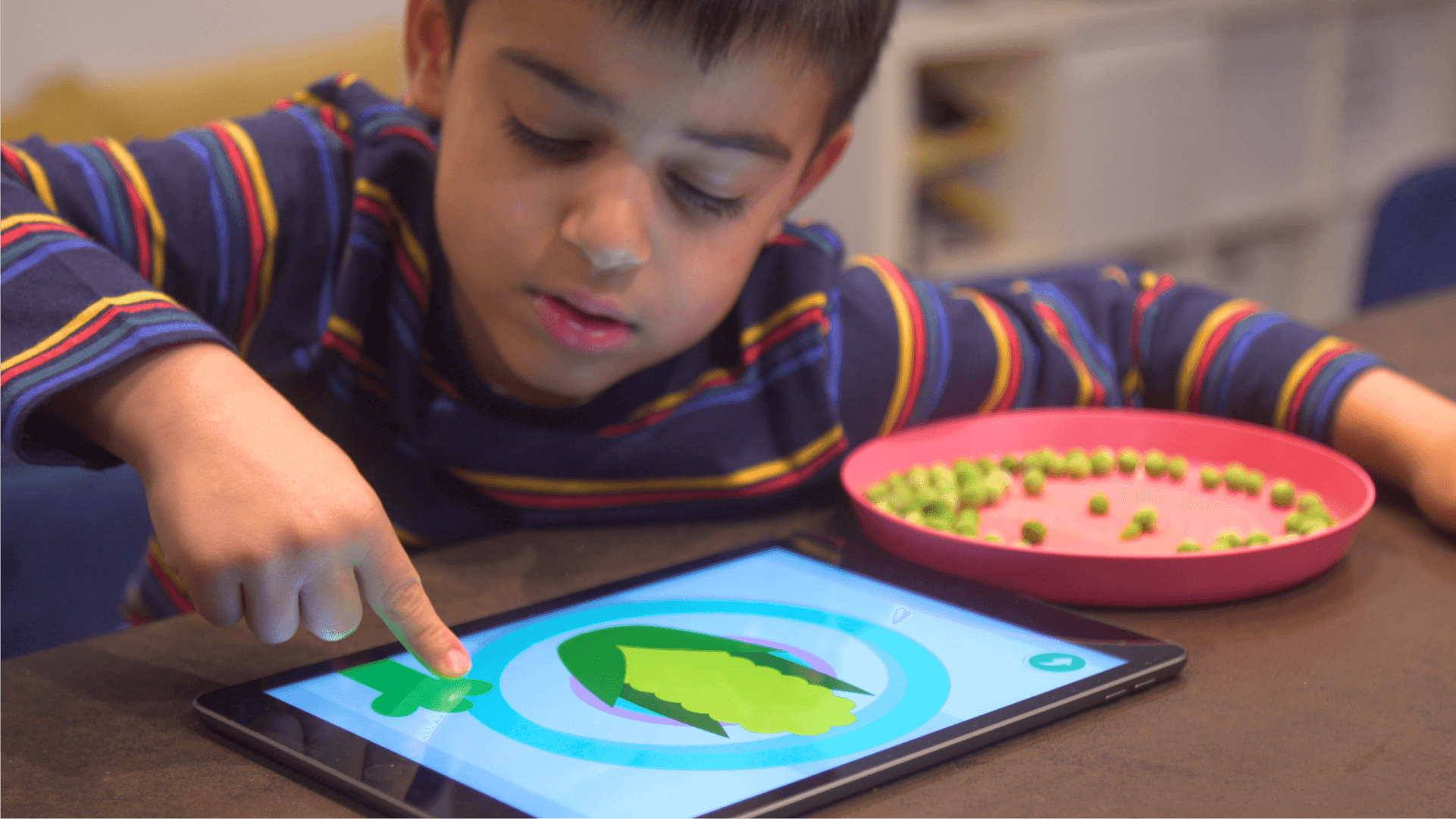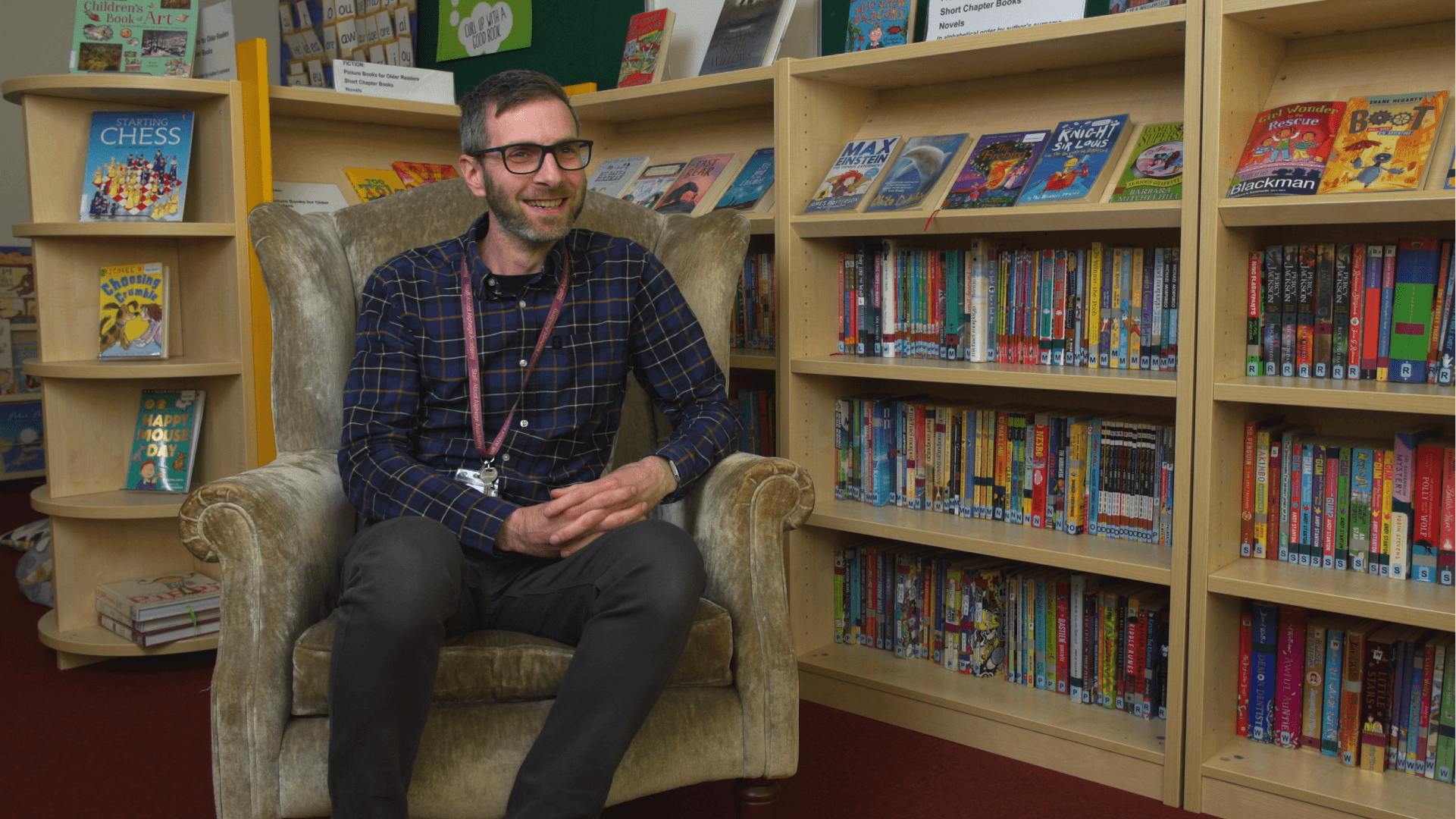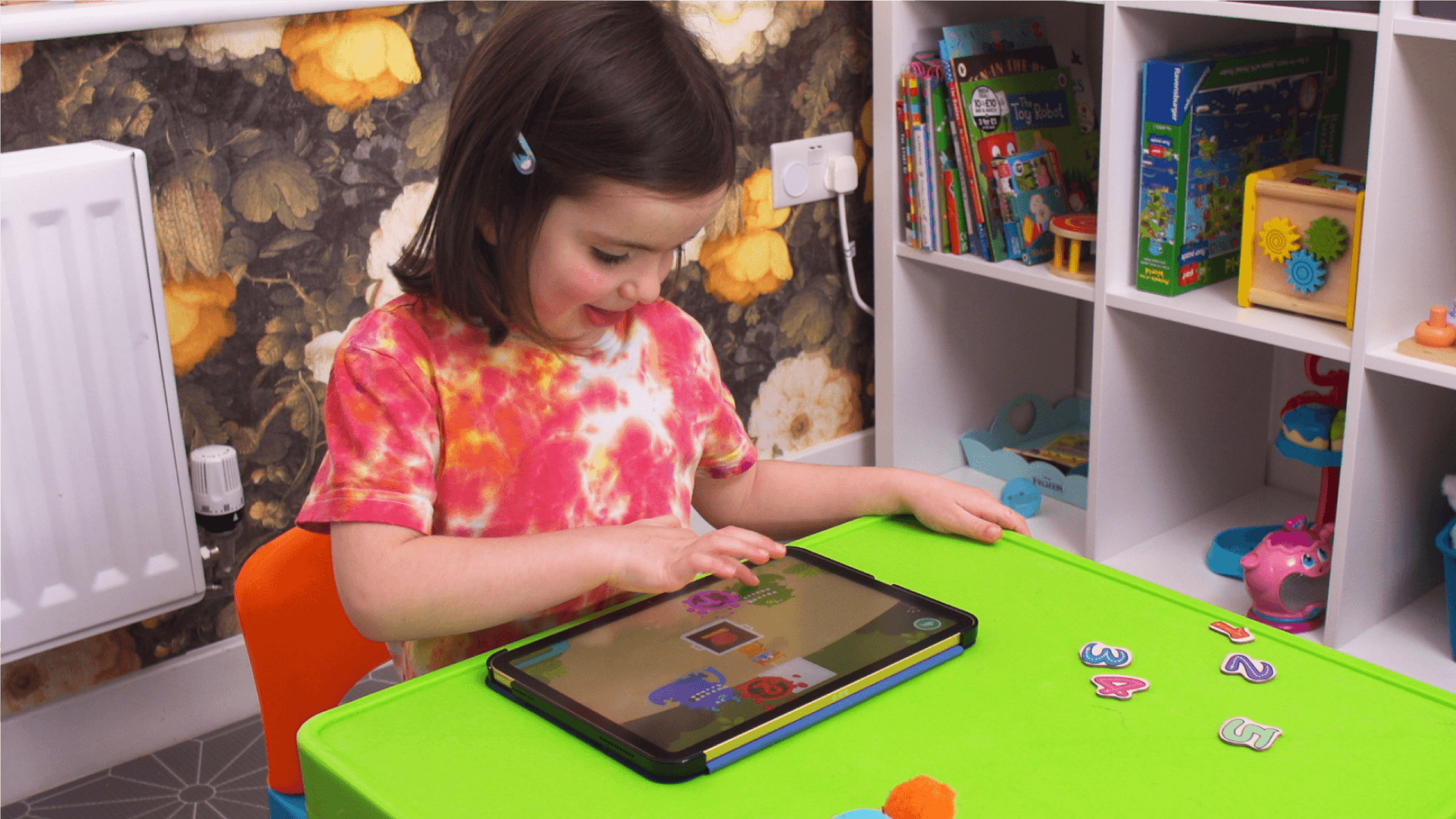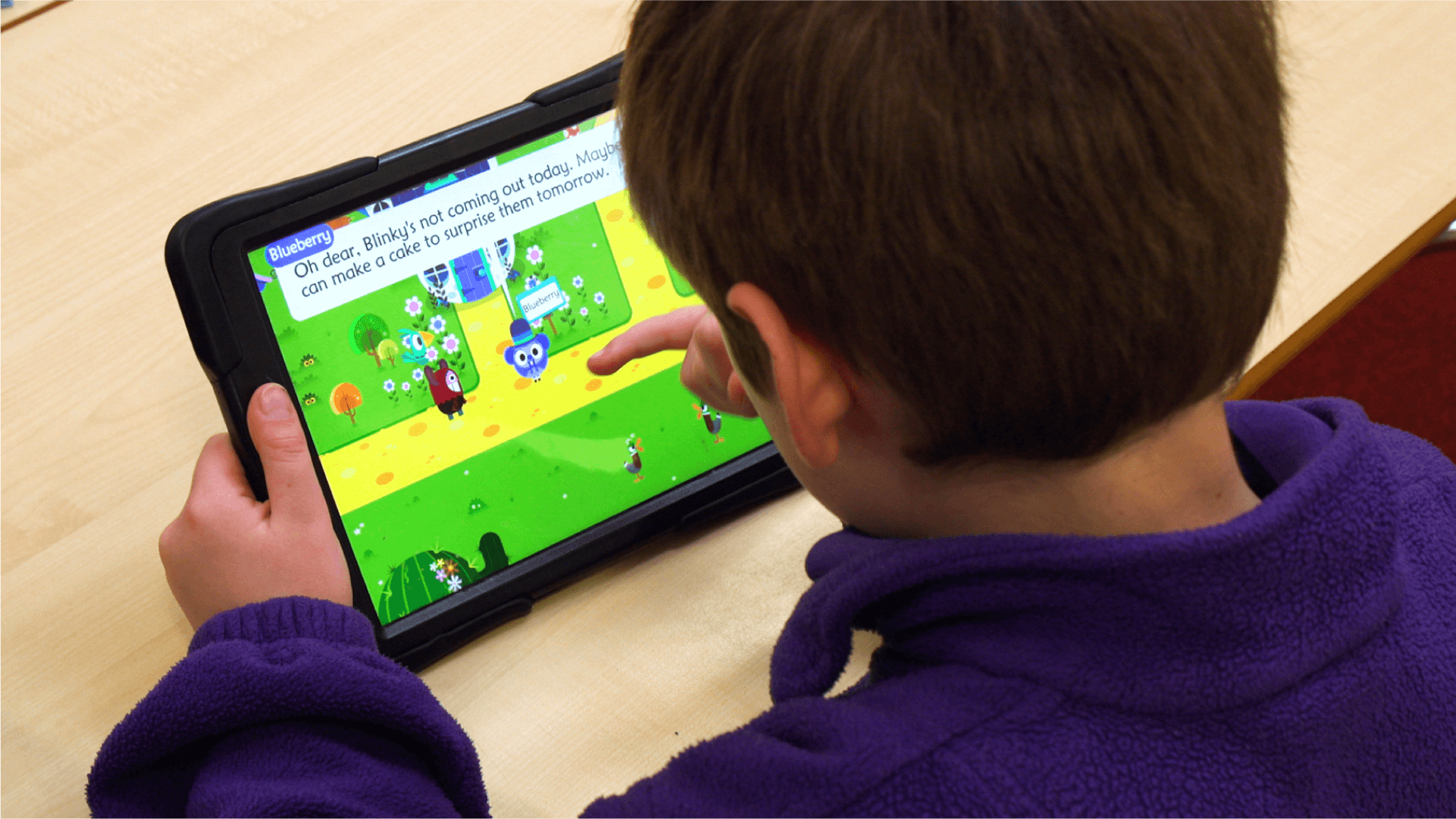Wellness and wellbeing apps designed specifically for children can play a vital role in fostering their holistic development and mental health from a young age - offering a range of age-appropriate activities and resources that promote emotional intelligence, mindfulness, physical activity, and positive habits. Here, we list what we believe are the best wellbeing apps for children to play on Apple, Android, Amazon and web.

From the team behind Teach Your Monster To Read and Teach Your Monster Number Skills, Teach Your Monster Adventurous Eating is a unique game that encourages kids to eat a broader range of fruit and veg and build a better relationship with food.
Designed in collaboration with Dr. Lucy Cooke (an expert in children's food preferences and eating habits,) Teach Your Monster Adventurous Eating is packed full of fun mini-games that encourage kids to explore new foods with all five of their senses.
Winner of the 2023 Games For Change Award for Best Learning Game, Go Nisha Go is aimed towards adolescent girls, and has been developed to empower players to make informed choices and shape their future with confidence as they grow out of childhood and into adulthood.
The story-driven game provides an entertaining space where adolescents can discover, learn, and build decision-making skills through interactive role play in a virtual world. Players go on a journey with the game's protagonist, Nisha, helping her navigate the course of her life.
Avokiddo Emotions lets kids of all ages explore feelings in a free play style. There are no rules or pre-set expectations other than to have fun while learning fundamental social skills.
Featuring a zany zebra, a shy sheep, a jolly giraffe, and a modest moose - children discover emotions by dressing up, feeding, sharing toys and interacting with the animals and becoming familiar with their personalities and reactions - inspiring curiosity as kids explore cause and effect relationships.
This simple app explores and demonstrates a way for children to calm down when faced with a frustrating situation. Using the 'breathe, think, do!' method, they'll learn to take long, deep belly breaths to calm down, think of a few strategies to handle the problem, and then do those things.
They'll laugh and learn as they help a Sesame Street monster friend calm down and solve everyday challenges such as putting on shoes, or going to school. This is a great way to help teach young children problem solving, self-control, and planning skills
Positive Penguins is a resilience building app that aims to teach children mindfulness and relaxation skills and to help them challenge negative thinking. Teaching youngsters how to identify and manage these feelings builds their resilience and helps with their overall emotional wellbeing.
The app features 5 minute graded and guided meditation and relaxation exercises to help children understand their thoughts and feelings.

We all know that screens are BIG parts of our lives. From spending all day staring at screens in the office, to a quick flick through social media, passing time in that sweaty tin can of a train journey on our evening commute. But what about for our kids? ‘You’ll get square eyes’ is now a threatening mix of guilty parental feelings and growing concerns over the potential impacts of excessive screen time on well-being and development.
The Digital Dilemma is that special tension between the potential benefits and concerns associated with screen time. On one hand, we know that screens can be powerful tools for learning, creativity, and social interaction. Holistically, screens have led to a more connected world, broadening our horizons and allowing other cultures, languages and experiences into our own front rooms. AND we all felt the massive benefits for education and keeping connected during the pandemic...
On the other hand, excessive screen time has been linked to a range of concerns. In a recent BBC survey of over 2,000 UK parents, 79% felt that their children have been using screens more since the pandemic, with 67% concerned about what their child is viewing. In particular, they were worried about the violence depicted on screen, the addictive nature of certain content and the use of foul language.
Although these factors are a massive concern, we would argue that this comes down to a matter of content and life balance, rather than the issues being with screen-time itself. As parents, carers and teachers, we can empower kids to navigate themselves to safe and fun environments online, just as they would do in the real-world, and alerting adults when they feel unsafe.
Valuable screen-time, such as watching educational programmes or using apps designed for kids, can promote independent learning, discovery and improve communication skills. 70% of the parents surveyed said that it is important that the content their child accesses comes from a trusted source. Trusted sources build for kids on a solid, pedagogical (teaching) basis, grounded in research, and hopefully using educational experts. Make sure to read the ‘about us’ section on gaming websites to find out about the research behind the games. Making it fun and entertaining is important too, keeping those little brains engaged and focused.

Primary school teacher, Adam Samuel (Abbott Alphege Academy, Bath) argues that “just 10 - 20 minutes of play a day would really help to greatly improve their passion for reading and surely be a welcome distraction during a long car journey!” When I taught in primary school, I would use educational screen time with my year 4 class and the kids always thought it was a reward for their hard-work - a win-win situation!
Making sure that screen-time is balanced with real-life experiences is the second factor and this can be a real joy for both child and parent. Asking kids to count out the number of apples needed at the supermarket can really boost those number skills picked up in that maths song you were listening to before, and why not read some labels using those phonics skills while they’re at it too?
Useful screen-time also presents an opportunity for connection as a family. As Nadia, a parent and Teach Your Monster super fan, says “we all kind of snuggle on the couch and watch them play. It’s a very nice way of having family time, they’re learning and having fun at the same time.”
The same BBC study found that 65% of the surveyed participants agreed that screen time has the ability to foster creativity and communication and an overwhelming 93% said that they are interested in educational programming for their children.
Ultimately, screens aren’t going anywhere so fostering open communication, setting clear boundaries, and prioritising a variety of activities, we all have the opportunity to guide our children towards responsible and balanced usage, in a way that promotes healthy development and well-being. It's worth remembering that square-eyes can be looking through a window into a valuable world of learning.
Finally, check out this awesome animation from the BBC about getting square eyes!
Kay Leathers,
Ex-Primary School Teacher and Contributor at Teach Your Monster.
Mathematics can be a daunting subject for many. Skipping over the fundamentals as a child can mean a lifetime of struggles in this area, which is why it’s so important to build a solid base as early on as possible. Here, we list the best quality math-focused apps for early years learners. on Apple, Android, Amazon and web.

Designed in collaboration with experts in early years mathematics, this fun-filled game offers an exciting new way to practice numbers, using the unique Singapore Mathematics method.
Aligned with the Pre-K/Reception curriculum, Teach Your Monster Number Skills has 40 fun-filled levels designed to build a strong foundation in mathematics, and covers areas such as number bonds, subtraction, addition, counting and much more. A dashboard is also available for both parents and teachers to track progress.
Downside: It currently only features numbers up to ten, with numbers up to 20 coming very soon!
Price: Free trial on iOS, Android, and Amazon. Free to play on PC and Mac
Designed for Reception-aged children, the award-winning Math Makers teaches kids a range of topics, including multiplication, division, fractions and counting, all through fun physics-focused games featuring hilarious, wacky characters. Kids will solve puzzles and carry out exciting challenges to achieve their goals.
Downside: A large number of puzzles require abstract thinking and logical reasoning and offer little to no help in solving them, which can cause frustration.
Price: Free on iOS and Android, includes in-app purchases.
This is a great games-based numbers platform for home learning, to accompany children throughout their early mathematical education and is designed by experienced teachers, gamers and parents. There are over 150 mathematics lessons to practice, with a fully developed comprehensive curriculum that has been designed to mirror school Standards.
Downside: Because this game caters to a large range of abilities, it may not be suitable for everybody within its target demographic.
Price: £2.49. Available on iOS and Android
This official Sesame Street app features Elmo teaching reception-aged children number identification, subitising, number tracing and more. There is tons to explore with songs and videos, coloring pages and games - all focused around numbers 1-20. Plus, parents can track and see what their kids are learning.
Downside: Reviews claim that the image of Elmo only features in the introduction, with the remainder of the game only playing his voice, so kids might be disappointed!
Price: £4.49. Available on iOS and Android
All the essentials of mathematics are covered in this game, including counting, addition and subtraction, place value and writing numbers. Quick Math Jr learns as kids play, adjusting the difficulty of the questions to make sure each individual player is always at a level that is just right for them. The game features a total of twelve games, all aligned with international maths curricula, including US Common Core and the Australian National Curriculum.
Downside: Pricey, at a cost of £7.99
Price: £7.99. Available on iOS
Available in English, Spanish, French, Portuguese and Russian, Drive About Numbers allows preschoolers to “drive”, “fly”, or “sail” around Number Neighbourhood, visiting familiar destinations while learning basic math skills and fine motor skills along the way, through verbal instruction.
This Parents’ Choice award-winning game created by educational game designers encourages free play, allowing kids to practice early numeracy at their own pace.
Downside: There is no clear ending to each game and no reward system upon completion.
Price: £2.49. Available on iOS
Designed to be used both at home and in the classroom, 1-Minute Maths helps pupils build greater number confidence and fluency, with targeted practice in engaging, one-minute chunks. After choosing a topic, users answer a series of randomly generated questions and when the one minute’s up, the questions are automatically marked and presented on a breakdown screen, giving instant feedback on how they’ve done. There are a total of 41 topics with hints available when needed.
Downside: Visually, some may find this game isn’t as exciting as others on offer
Price: Free on iOS, Android, and Amazon
An immersive game with a massive 4000+ library of content to practice, covering over 400 curriculum-aligned maths areas. There are personalised daily learning plans, exciting rewards and narrative-driven games to keep early years learning fun. A real-time progress dashboard offers easy tracking for both parents and teachers.
Downside: Some of the games may feel a little too challenging
Price: Free on iOS, Android and web. Includes in-app purchases
This inclusive and accessible maths app has reached #1 in the Apple App Store in over 20 countries. It covers all the fundamentals of early maths education, including multiplication, subtraction, counting and number concepts. Clocks and calendars also assist children in learning how to tell the time and the days of the week.
Downside: The drag-and-drop and write-in-your-answer options might be tricky to manoeuvre, and some trace numbers, if not written clearly, will not be recognised.
Price: Free to try on Android and iOS, then a range of subscription prices
Finding good quality apps or games to help your Reception or Pre-K aged child learn to read is hard - there are just so many. Here, we list the best apps for early years learners to get them started on their reading journey.

This app, created by non-profit Teach Your Monster - who are part of the Usborne Foundation - is both designed in collaboration with leading academics and aligned with school curriculums. It is suitable for both home learning and in the classroom, complementing all synthetic phonics programmes. Children create a custom monster and take it on its own reading adventure, meeting other fun characters and winning exciting prizes. The game covers everything from letters and sounds, to reading full sentences, and even offers a tracking tool for parents and teachers to see how learning has progressed.
Downside: Some may find games a little repetitive.
Price: £4.99 on iOS, Amazon and Android. Free on PC and Mac
Created as a follow-up to Teach Your Monster to Read, Reading for Fun is focused on helping children develop a love for reading, rather than only reading to learn. Kids carry out fun chores and challenges and are rewarded with e-books, which include everything from comics to recipes - helping reception-aged children learn a variety of reading. With over 70 books on offer, there’s plenty to explore!
Downside: Some children may be frustrated by the need to complete challenges to win their books
Price: Free on iOS, PC and Mac
Designed alongside experts, Duolingo ABC offers a number of interactive stories and 700 bite-sized reading lessons, to help preschoolers build reading fluency over time. Fun imagery and highlighted words assist children in reading independently, and rewards keep kids motivated to learn, whilst building confidence.
Downside: Children are unable to select a starting point, which can be tedious for those who might already be a bit more advanced.
Price: Free on iOS
Following the Homer method - a 4-step process that teaches letter sounds and symbols, then adds those letters into words, words into ideas and then those ideas into knowledge through thinking skills - children are taken on a personalised learning journey, with interactive lessons, activities, stories and more - all adjusted by age, skill level and interests.
Downside: There’s an emphasis on alphabet and phonics but with little attention to comprehension.
Price: Free to try on iOS and Android and then $9.99 per month or $59.99 per year
Epic! Offers an unlimited library of over 40,000 books for children to access, from respected publishers such as harperCollins and Scholastic. In-app progress tracking and weekly progress emails help teachers and parents keep an eye on development, and badges and rewards encourage learners to keep motivated. There are two subscriptions to pick from, each one tailored either to families or to educators, and each one allows for a number of profiles.
Downside: Watch out for subscription auto-renewals. Also, the game is not available on Amazon devices.
Price: Free to try. Subscriptions are $9.99 per month or $79.99 per year
Ideal for preschool and kindergarten-aged children, hooked on phonics is designed with the help of childhood education experts and utilises cutting-edge research to assist learners in working on areas that they may be struggling in. There are over 250 songs, award-winning videos, interactive games, reading lessons and e-books on offer and parents will have an insight into progression thanks to reporting features.
Downside: The game focuses on repetition to ingrain ideas but some children may find this a little boring.
Price: Available for iOS, Android, Amazon, Mac and PC. 1 month: $6.99, 1 year: $39.99, lifetime subscription: $49.99.
Designed by the BAFTA award-winning team at Alphablocks Ltd, Meet the Alphablocks is a spin-off from the popular hit TV show as seen on Cbeebies. This fun game helps children learn letter sounds and names, using best-practice phonics as taught in UK schools. Conveniently, videos are available both to stream and download for when you’re out and about.
Downside: Some reviews suggest that a number of games are difficult to find within the app
Price: Free on iOS, Android, and Amazon
Used by over 20 million children across thousands of schools, this award-winning app features alphabet games, spelling games, phonics activities, word puzzles, nursery rhymes and over 3,000 story books for kids.
Five essential components of reading are covered: Phonics, phonemic awareness, vocabulary, fluency and comprehension, and much like the other great educational apps we’ve mentioned so far, a reward system motivates children to keep going!
Downside: Design feels a little outdated and a subscription is required
Price: Available on iOS, Android, PC and Mac. 30 days free and then £6.99 per month
Reading magic brings the best-selling Bob Books to life, with a phonics-based reading game featuring a simple drag-and-drop interface. Bob Books characters and full-color animations encourage kids along the path of learning to read and children will master a number of skills, including making the connection between letters and sounds, sounding out simple words, and spelling words that they’ve read. The game includes twelve scenes for a total of 32 words. Four game levels provide increasing learn-to-read challenges for children as they play.
Downside: Unavailable on Android
Price: £2.99 on iOS
Ooka Island transforms teaching foundational reading skills by breaking the process down into thousands of micro-actions — 6,695 to be exact. With a robust methodology and highly adaptive technology, this game personalises each student’s path toward fluent reading.
Built on Dr. Kay MacPhee’s proven, research-based concepts, Ooka Island leads with securing children's phonemic awareness while teaching phonological skills to ensure reading words becomes as effortless as speaking, so that students can focus on comprehension.
Downside: Some reviews state that they had issues with in-game glitches
Price: Free on iOS and Android




